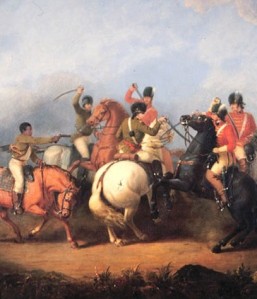 On February 18, 2014, Tom Cutterham asked, “Was the American Revolution a Civil War?” According to Cutterham, understanding the Revolution that way might be useful. If we did, he suggested, “we’d better understand the way the modern world—the nexus of state, citizen, and property—was born in and determined by violence.”[1] Continue reading
On February 18, 2014, Tom Cutterham asked, “Was the American Revolution a Civil War?” According to Cutterham, understanding the Revolution that way might be useful. If we did, he suggested, “we’d better understand the way the modern world—the nexus of state, citizen, and property—was born in and determined by violence.”[1] Continue reading
Tag Archives: David Armitage
The JuntoCast, Episode 11: The Declaration of Independence
 What better way to get ready for celebrating July 4th than to listen to the newest episode of “The JuntoCast” on the Declaration of Independence? Continue reading
What better way to get ready for celebrating July 4th than to listen to the newest episode of “The JuntoCast” on the Declaration of Independence? Continue reading
Was the American Revolution a Civil War?
 “Every great revolution is a civil war,” as David Armitage has recently remarked. That insight could change the way we think about the American Revolution. Contemporaries understood it that way—or at least, they did at first. David Ramsay, the first patriot historian of the war, held that the Revolution was “originally a civil war in the estimation of both parties.” Mercy Otis Warren wrote that the fires of civil war were kindled as early as the Boston massacre. But in the narratives of these historians, the moment the United States declared independence was the moment the conflict stopped being a civil war. It was no longer being fought within a single imperial polity. Now it was a war between two nations.[1] Continue reading
“Every great revolution is a civil war,” as David Armitage has recently remarked. That insight could change the way we think about the American Revolution. Contemporaries understood it that way—or at least, they did at first. David Ramsay, the first patriot historian of the war, held that the Revolution was “originally a civil war in the estimation of both parties.” Mercy Otis Warren wrote that the fires of civil war were kindled as early as the Boston massacre. But in the narratives of these historians, the moment the United States declared independence was the moment the conflict stopped being a civil war. It was no longer being fought within a single imperial polity. Now it was a war between two nations.[1] Continue reading
Hybrid Moments: Should there/Could there be Atlantic Musicology?
In a week I’ll be heading to Little Rock for the Society of American Music Conference, where I’ll be chairing and presenting at a session on music in the Atlantic world. My paper is titled “Strategizing Atlantic Musicology” and in it I’m discussing some of the benefits and drawbacks for incorporating ideas from Atlantic studies into musicology. (I’m also hoping to claim the Pithiest Title Prize). I thought I’d try out a few of my ideas and concerns here, and hopefully tap the collective wisdom of the Junto community.
To give a little background: I’ve been thinking about Atlantic studies and music for a while–I wrote a dissertation about how transatlantic music shaped the identities of early American communities, and wrote a musicology article that uses concepts from Atlantic history to interpret musical networks in the early modern period. I’ve also delivered conference papers on that touch on this topic. But this is the first paper I’ve written that is devoted entirely to question of how (and whether) musicology could engage with Atlantic studies. Continue reading